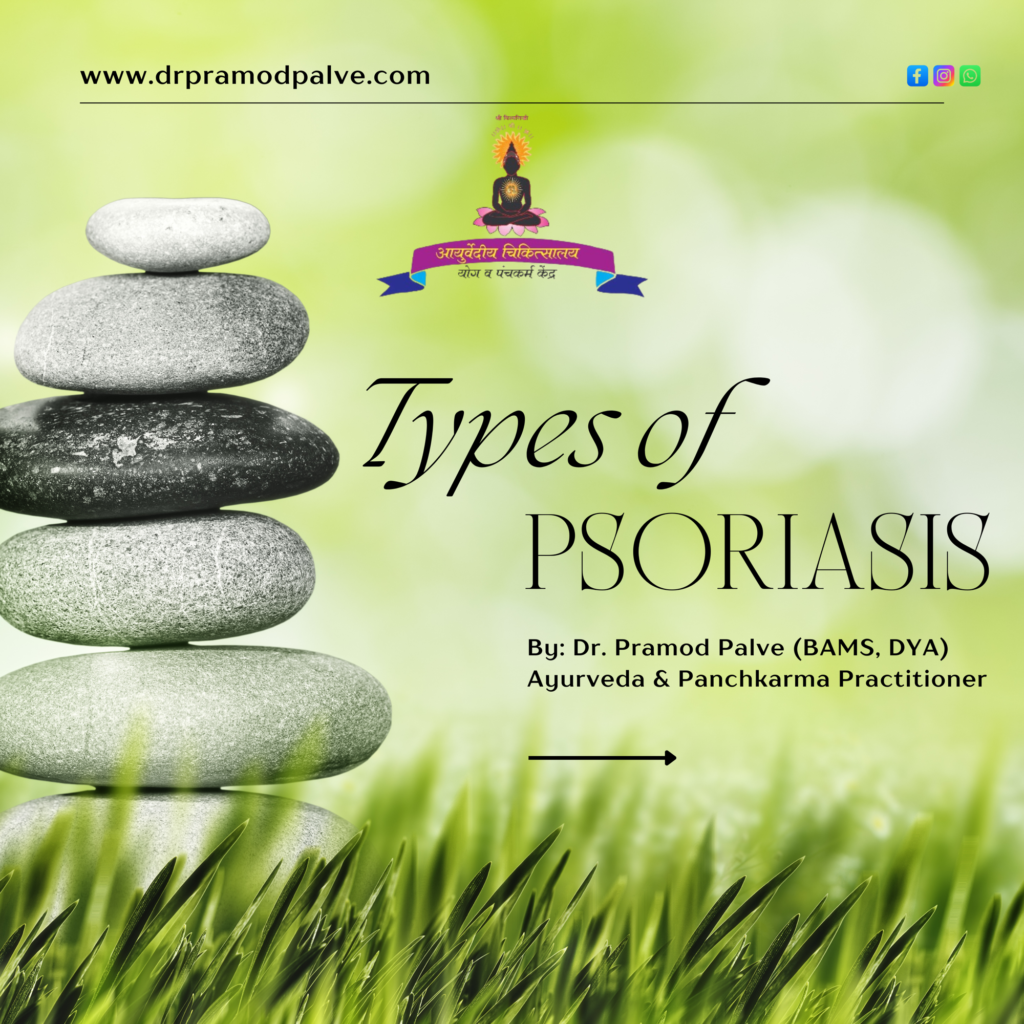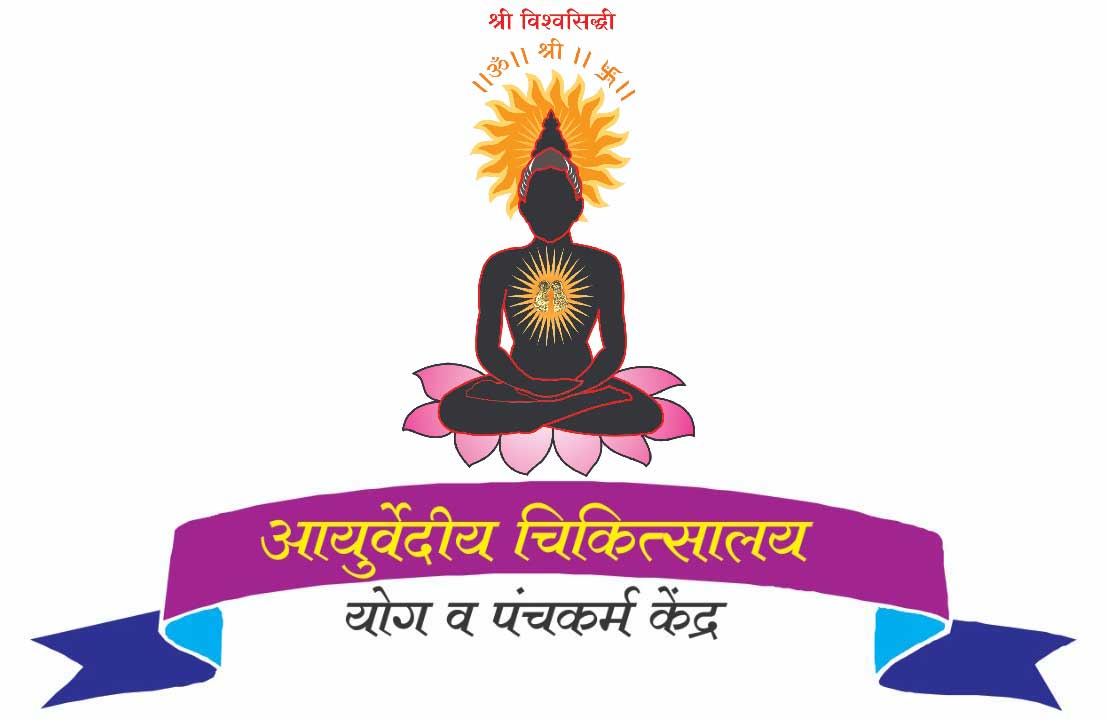Introduction
Psoriasis is a chronic autoimmune skin condition that accelerates the life cycle of skin cells, causing them to build up rapidly on the surface of the skin. These extra skin cells form scales and red patches that can be itchy and sometimes painful. At Vishwasiddhi Ayurveda & Panchkarma Centre located in Ahmednagar & Pune, Maharashtra, Dr. Pramod Palve, a seasoned Ayurveda and Panchkarma practitioner with over 15 years of expertise, leads a skilled team in providing effective treatments for various types of psoriasis. This article delves into the different types of psoriasis and how Ayurveda can offer relief.

Types of Psoriasis
1. Plaque Psoriasis (Psoriasis Vulgaris)
- Description: This is the most common type of psoriasis, characterized by raised, inflamed, red lesions covered with silvery white scales. These plaques frequently appear on the elbows, knees, scalp, and lower back.
- Ayurvedic Perspective: According to Ayurveda, plaque psoriasis is often a result of imbalanced doshas, particularly Vata and Kapha. Vishwasiddhi Ayurveda & Panchkarma Centre offers customized treatments to balance these doshas and provide relief.
2. Guttate Psoriasis
- Description: This type is characterized by small, drop-shaped, red spots on the skin. It often starts in childhood or young adulthood and can be triggered by infections like strep throat.
- Ayurvedic Perspective: Guttate psoriasis is often linked to an imbalance in the Pitta dosha. Ayurvedic treatments focus on detoxification and herbal remedies to balance Pitta and alleviate symptoms.
3. Inverse Psoriasis
- Description: Inverse psoriasis appears as bright red, shiny lesions that develop in skin folds, such as under the breasts, in the groin, or around the buttocks.
- Ayurvedic Perspective: Inverse psoriasis is associated with aggravated Kapha and Pitta doshas. Treatments at Vishwasiddhi Ayurveda & Panchkarma Centre include lifestyle modifications and herbal applications to soothe the affected areas.
4. Pustular Psoriasis
- Description: This type is characterized by white pustules (blisters of noninfectious pus) surrounded by red skin. It can be localized to certain areas or widespread.
- Ayurvedic Perspective: Pustular psoriasis is linked to severe imbalances in all three doshas (Vata, Pitta, and Kapha). Ayurvedic treatments focus on comprehensive detoxification and balancing all doshas.
5. Erythrodermic Psoriasis
- Description: This is a rare and severe form of psoriasis that leads to widespread, fiery redness over most of the body, causing severe itching and pain.
- Ayurvedic Perspective: Erythrodermic psoriasis is considered a serious condition requiring immediate attention. Treatments at Vishwasiddhi Ayurveda & Panchkarma Centre involve intensive detoxification and pacification of the aggravated doshas.
Ayurvedic Treatment for Psoriasis at Vishwasiddhi Ayurveda & Panchkarma Centre
Dr. Pramod Palve and his experienced team at Vishwasiddhi Ayurveda & Panchkarma Centre offer a holistic approach to psoriasis treatment. The focus is on balancing the doshas, detoxifying the body, and strengthening the immune system. Here are some key components of their treatment approach:
1. Panchakarma Therapy
- Detoxification: Panchakarma therapies such as Vamana (therapeutic vomiting), Virechana (purgation), and Basti (medicated enema) help in detoxifying the body and removing toxins that contribute to psoriasis.
- Rejuvenation: These therapies also rejuvenate the body, promoting overall health and well-being.
2. Herbal Remedies
- Internal Medications: Ayurvedic herbs like Neem, Turmeric, and Aloe Vera are used internally to balance doshas and improve skin health.
- Topical Applications: Herbal oils and pastes are applied to the affected areas to soothe the skin and reduce inflammation.
3. Diet and Lifestyle Modifications
- Diet: Patients are advised to follow a Pitta and Kapha balancing diet, avoiding foods that aggravate these doshas.
- Lifestyle: Recommendations include stress management techniques, regular exercise, and proper sleep to support overall health.
4. Specific Treatments for Different Types of Psoriasis
- Plaque Psoriasis: Treatments focus on detoxifying the body and applying soothing herbal pastes to reduce scaling and inflammation.
- Guttate Psoriasis: Ayurvedic therapies are aimed at balancing Pitta and improving immunity to prevent flare-ups.
- Inverse Psoriasis: The focus is on maintaining dryness in skin folds and using herbal remedies to reduce inflammation.
- Pustular Psoriasis: Intensive detoxification and balancing all three doshas are key to managing this type of psoriasis.
- Erythrodermic Psoriasis: Immediate and intensive care is provided to stabilize the condition and reduce symptoms.
Why Choose Vishwasiddhi Ayurveda & Panchkarma Centre?
- Experienced Practitioners: Dr. Pramod Palve, recognized as the best Ayurveda doctor in Ahmednagar, leads a team of skilled practitioners with extensive experience in treating psoriasis.
- Customized Treatment Plans: The center offers personalized treatment plans tailored to individual needs, ensuring effective management of psoriasis.
- State-of-the-Art Facilities: Equipped with modern amenities, the center provides a comfortable and therapeutic environment for patients.
- Holistic Approach: Combining Panchakarma therapy, herbal remedies, and lifestyle modifications, the center ensures a comprehensive approach to treating psoriasis.
FAQs
1. What causes psoriasis according to Ayurveda?
- According to Ayurveda, psoriasis is caused by an imbalance in the doshas, particularly Vata and Kapha, and the accumulation of toxins (Ama) in the body. Factors such as poor diet, stress, and improper lifestyle can contribute to this imbalance.
2. Can Panchakarma therapy cure psoriasis completely?
- While Panchakarma therapy can significantly reduce the symptoms of psoriasis and improve overall health, it is not a cure. Continuous management and lifestyle adjustments are necessary to keep the condition under control.
3. How long does it take to see results from Ayurvedic treatment for psoriasis?
- The duration to see noticeable results varies from person to person. Some patients may experience relief within a few weeks, while others may require several months of consistent treatment.
4. Is Ayurvedic treatment safe for all types of psoriasis?
- Yes, Ayurvedic treatment is generally safe for all types of psoriasis. However, it is essential to consult with a qualified Ayurveda practitioner to receive a personalized treatment plan tailored to your specific condition.
Vishwasiddhi Ayurveda & Panchkarma Centre in Ahmednagar and Pune offers effective and holistic treatments for various types of psoriasis. With Dr. Pramod Palve’s expertise and the center’s comprehensive approach, patients can achieve significant relief from psoriasis symptoms and improve their overall quality of life.
